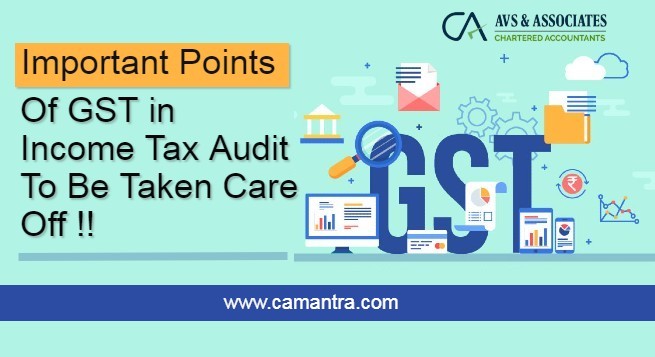After Corona pandemic relief, income-tax audit season is approaching now.
Now, let’s understand what are the important points of GST which are to be remembered while doing Tax Audit under Income Tax Act, 1961?
These are few important points of GST which shall be checked while doing Income Tax Audit and filing 3CD FORM:
Clause 4: The GST no. of the assessee should be reported in clause 4 of the TAR (Tax Audit Report)
Clause 10(b): Nature of business as reported in this clause and as shown at the time of GST registration are in the same line. If there is any change made in the nature of business then GST registration shall be amended for the same.
Clause 13(f): ICDS-II needs that the valuation of sales, purchase, stock etc. to be reported at the value including ITC (input tax credit) of GST. However, the overall effect is nil on the profit & loss account.
Clause 16(d) & Clause 16(e): In this clause, income which is not reported in the profit and loss account for example, rent income credited to the capital account of the proprietor. Taxpayers should pay attention that if GST is payable on such income or not.
Clause 17: According to the Income-tax Act, sale consideration for the transfer of land or building or both is considered as the transaction value or the value for stamp duty purpose, whichever is higher as per section 43CA. Taxpayers need to pay attention that GST if applicable in case of transfer of under constructed building in case of builders & developers is needed to be paid on the transaction value.
Clause 18: In this clause reporting of depreciation charged on fixed assets is noted. Taxpayers should keep in mind that if depreciation is claimed then ITC of GST portion is not available and vice-versa.
Clause 21(a): This clause needs reporting of expenses of personal nature debited to profit & loss account. In such cases, taxpayers should check whether the ITC is blocked under CGST Act, 2017- section 17(5). Like expenses for personal purposes, membership fees of the club, etc.
Clause 21(8): This clause needs reporting of tax deducted at source of foreign parties. Taxpayers should keep in mind that services imported from the foreign party are treated as supply under GST and IGST is liable to be paid under Reverse Charge Mechanism (RCM).
Clause 27: In this clause, details of Cenvat opening, closing, etc figures need to be given herewith. Input Tax Credit as per the GST Act is to be given in Clause 44.
Clause 23: Related party transactions are reported under this clause 23. Taxpayers should check that if ITC is not available to the related party (buyer) then the taxable value for charging GST needs to be derived from the valuation rules.
Clause 26: Under this clause reporting of the taxes and other government dues paid within the due date. Taxpayers need to check that for the month of March GST is paid within the due date.
Clause 41: Reporting of taxes demanded and refunded tax reported under this clause. Taxpayers should report the amounts of GST refunds received or demands raised.
Clause 44: Complete break up of total expenses and input tax credit details according to the GST is to be reported under this clause.
What are the details of GST required to be reported in Income tax returns ITR 3, ITR 4, ITR 5, and ITR 6?
In ITR of business and profession following information is asked for:
Business-related information in the ITR: The taxpayer should report here the outward supplies as per GST returns.
Form 26AS: Summary of sales reported in GST returns is being reflected in Form 26AS. There is a difference in GST sales & sales as per income tax due to reasons like branch transfers, etc. Taxpayers need to make the reconciliation statement of the sales according to the GST returns and sales as shown in the ITR.
With the use of information technology, information can be used for various purposes. In the future integration of income tax and GST, data will go hand to hand hence taxpayers should avoid mishandling of information.

